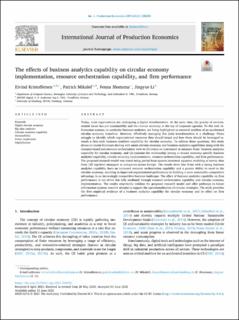| dc.contributor.author | Kristoffersen, Eivind | |
| dc.contributor.author | Mikalef, Patrick | |
| dc.contributor.author | Blomsma, Fenna | |
| dc.contributor.author | Li, Jingyue | |
| dc.date.accessioned | 2023-02-06T14:20:32Z | |
| dc.date.available | 2023-02-06T14:20:32Z | |
| dc.date.created | 2021-06-21T12:31:03Z | |
| dc.date.issued | 2021 | |
| dc.identifier.citation | International Journal of Production Economics, 2021, 239, 1-19 | en_US |
| dc.identifier.issn | 0925-5273 | |
| dc.identifier.uri | https://hdl.handle.net/11250/3048647 | |
| dc.description.abstract | Today, most organizations are undergoing a digital transformation. At the same time, the gravity of environmental issues has put sustainability and the circular economy at the top of corporate agendas. To this end, information systems, in particular business analytics, are being highlighted as essential enablers of an accelerated circular economy transition. However, effectively managing this joint transformation is a challenge. Firms struggle to identify which organizational resources they should target and how those should be leveraged towards a firm-wide business analytics capability for circular economy. To address these questions, this study draws on recent literature dealing with smart circular economy and business analytics capabilities along with the resource-based and resource orchestration view to (1) create an instrument to measure firms’ business analytics capability for circular economy, and (2) examine the relationship among a circular economy-specific business analytics capability, circular economy implementation, resource orchestration capability, and firm performance. The proposed research model was tested using partial least squares structural equation modeling of survey data from 125 top-level managers at companies across Europe. The results show that firms with a strong business analytics capability have an increased resource orchestration capability and a greater ability to excel in the circular economy, resulting in improved organizational performance in building a more sustainable competitive advantage in an increasingly competitive business landscape. The effect of business analytics capability on firm performance is not direct but fully mediated through resource orchestration capability and circular economy implementation. The results empirically validate the proposed research model and offer pathways to future information systems research streams to support the operationalization of circular strategies. The study provides the first empirical evidence of a business analytics capability for circular economy and its effect on firm performance. | en_US |
| dc.language.iso | eng | en_US |
| dc.publisher | Elsevier | en_US |
| dc.rights | Navngivelse 4.0 Internasjonal | * |
| dc.rights.uri | http://creativecommons.org/licenses/by/4.0/deed.no | * |
| dc.subject | Digitalization | en_US |
| dc.subject | Policy implication | en_US |
| dc.subject | Sustainability | en_US |
| dc.subject | Circular economy capability | en_US |
| dc.subject | Big data analytics | en_US |
| dc.subject | Digital circular economy | en_US |
| dc.title | The effects of business analytics capability on circular economy implementation, resource orchestration capability, and firm performance | en_US |
| dc.type | Peer reviewed | en_US |
| dc.type | Journal article | en_US |
| dc.description.version | publishedVersion | en_US |
| dc.rights.holder | © 2021 The Author(s). Published by Elsevier B.V. | en_US |
| dc.source.pagenumber | 1-19 | en_US |
| dc.source.volume | 239 | en_US |
| dc.source.journal | International Journal of Production Economics | en_US |
| dc.identifier.doi | 10.1016/j.ijpe.2021.108205 | |
| dc.identifier.cristin | 1917237 | |
| dc.source.articlenumber | 108205 | en_US |
| cristin.ispublished | true | |
| cristin.fulltext | original | |
| cristin.qualitycode | 2 | |

